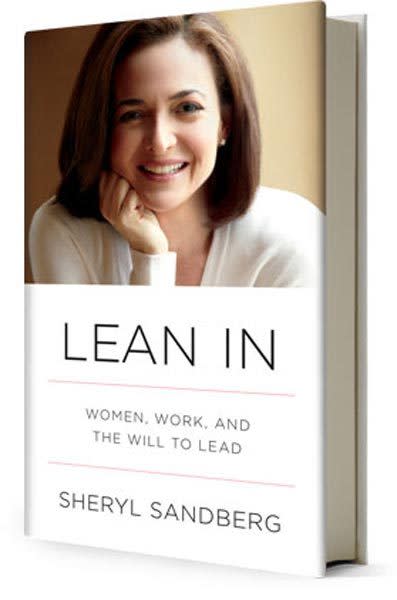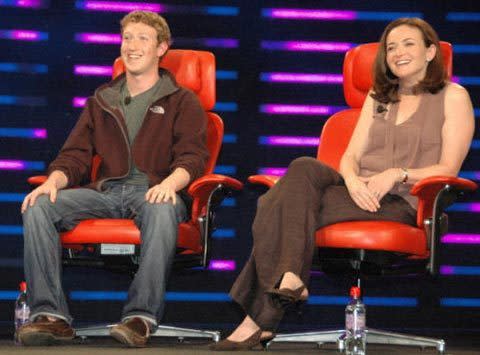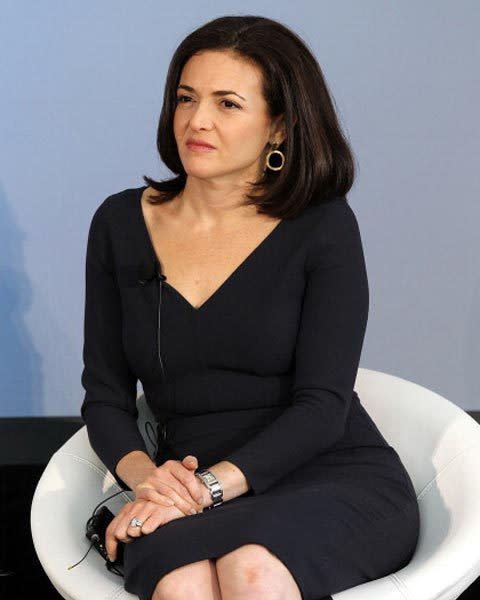Facebook COO Sheryl Sandberg Kickstarts Modern Feminism
Sheryl Sandberg was stuck on a private jet last year when she discovered that her four-year-old daughter had nits. The chief operating office of Facebook, and fifth most powerful woman in the world, according to Forbes magazine in 2011, had hitched a ride aboard the eBay Gulfstream with her kids (as you do) to get to a conference when her little girl announced, “Mommy! My head itches!”
“I was the only person bringing young children on this corporate plane – and now my daughter most likely had lice!” she writes of the experience in her new book Lean In: Women, Work and the Will to Lead. “I spent the rest of the flight in a complete panic, trying to keep her isolated, her voice down and her hands out of her hair, while I furiously scanned the web for pictures of lice.”
It’s a curious image: one of the most powerful business executives in the world desperately trying to stop her daughter from giving nits to a clutch of Silicon Valley titans. But it also perfectly illustrates the sort of everyday conflict women face when their professional and personal worlds collide - even the worlds of multimillionaires on private jets.
The nit episode is just one of the many “road to Damascus” type experiences that convinced Sandberg that it was time to speak out about why we still haven’t cracked the female work-life dilemma and why we seemed to have given up trying.
On the face of it, as her critics have been quick to point out, the tech industry’s It Girl seems an unlikely agent provocateur for working women. A double Harvard graduate (and former aerobics instructor), Sandberg made her name doing what has defeated so many others: helping turn two promising internet ventures - first Google and then Facebook – into global powerhouses. She’s a corporate success story with the bank balance to match, hosts dinner for Nobel Prize winners, and lives in a mansion. Hardly your average working mum, then.
Sandberg is hoping that her book will be the opening salvo in a far more ambitious campaign. Having assailed Silicon Valley’s twin, testosterone-driven domains - the boardroom and the hoodie-wearing bro culture – she has set herself a new, and arguably more daunting, challenge: kick-starting feminism, corporate style.
So today, in a pleasant but featureless conference room at the Facebook campus in Silicon Valley, Sandberg is ready to sell her personal brand of revolution – and she’s one charismatic saleswoman. With her mega-watt smile turned up to 11, the impeccably groomed 43-year-old strides into the conference room beaming with the easy bonhomie and high-gloss sheen of a presidential hopeful; the only incongruous note is a cartoonishly large plastic cup of soft drink clutched in one hand. Dressed in an on-trend monochromatic dress, she sets the drink down to shake hands with the intrigued audience members. The crowd, captivated, momentarily stops gulping down the watery coffee to watch her progress around the room. “Hello, I’m Sheryl,” she says to a blushing journalist. With a Facebook video camera recording her every stirring word, she launches into her speech, rattling off startling statistic after statistic, anecdote after anecdote.
“At my wedding, my brother and sister got up and gave a toast,” she relates, smiling. “They said, ‘Hi, we're David and Michelle. We're Sheryl's brother and sister. You may think we're just her siblings but really we were her first employees. Employee number one and employee number two. Sheryl never actually played as a child. She just kind of supervised other children's play,’ and I laughed.”
The room erupts in laughter, as if on cue. Sandberg waits for the noise to die down. She has a larger point to make about accidental sexism (and perhaps a minor score to settle with her siblings – the quip seems to have stung).
“That joke has a tinge of something else,” she continues, “which is that we call our little girls, but not our little boys, ‘bossy’. If we get more women into leadership roles, we will start assuming that women can lead. We will stop seeing leadership as something to make a joke about at someone's wedding.”
Perhaps the most controversial take-away from Lean In is Sandberg’s argument that women unconsciously sabotage themselves by shying away from their own ambition, leadership talent and career opportunities, conjuring up career obstacles way before they actually even appear on the horizon.
She argues that, aside from the - not inconsiderable - structural barriers in the workplace, women often lack, say, the confidence to put up their hand for a promotion or pay-rise (“I’m not good enough for that role”; “I’ll get a rise when I really deserve it”). They’ll sit off to one side rather than plonk themselves down at the big table with the boys (“Little ol’ me! I’m fine over here!”). They’ll talk themselves out of a senior job, not because they don’t want it, but because they plan to have children down the track.
All of this, Sandberg argues, is classic “leaning out” behavior. Men, she says, naturally “lean in”. Her answer? Be braver, louder and just plain unapologetic when it comes to what we want in life.
Sheryl Sandberg might seem to exist on a rarefied plane beyond the reach of us mere mortals (hobnobbing with President Barack Obama; having Mark Zuckerberg on speed dial) but, while the dollars may be different, she says she’s faced many of the same struggles, been beset by the same doubts and fears, and fallen into the same gender traps as women the world over.
RELATED: How Do You Define Success?
In Lean In, she recalls being heavily pregnant with her first child and waddling across the length of the car park at Google, breathlessly trying to make it to a meeting. When she told her husband that night about her awkward dash, he pointed out that at his company, Yahoo, there were designated parking spots for pregnant women. Hello! Sandberg was chagrined to realize that here she was, a senior woman in the company, and yet she’d never considered the needs of expecting workers, until she was one. She put the parking proposal to her bosses and they agreed. It wasn’t hard, but no-one had thought about it.
When she went to Facebook from Google, she found herself in salary talks with Zuckerberg. He made her an offer she thought was fair. If she tried to negotiate, she feared, the then 23-year-old dynamo might change his mind about offering her the gig. But, just before she was about to say yes, her brother-in-law exploded: “Damn it, Sheryl! Why are you going to make less than any man would make to do the same job?” He didn’t even know the details. “His point was simply that no man at my level would consider taking the first offer.” She returned to Zuckerberg and told him she couldn’t accept. She prefaced it, however, by saying that as he was hiring her to run his deal teams, he’d want her to be a good negotiator. So she negotiated – hard. He improved the offer.
Sandberg also admits that being ranked number five on Forbes' most powerful women list in 2011, ahead of Michelle Obama and Sonia Gandhi, sent her into a spin. As news of the list spread, she felt embarrassed and flustered, brushed off congratulations from workmates, and begged friends to take the link off Facebook. Her long-time assistant, Camille Hart, pulled her into a room to read her the riot act: Sandberg’s reaction, she warned, was betraying how uncomfortable she was with her own power. “When they say congratulations, say thank you and that’s it,” advised Hart. A man, Sandberg realised, would have reveled in the accolade.
Come 5.30pm every day, Sandberg famously packs up and heads home for dinner with her husband, SurveyMonkey CEO Dave Goldberg, and their two children, a son, seven, and a daughter, five. So controversial is that outwardly simple act that, when she mentioned it publicly, it made global headlines.
On the other hand, after dinner with her kids and bedtime stories, Sandberg goes back to the digital coalface – working from her computer at home. She gets up at 5am. “I’m available around the clock because I have to be and it’s just part of the job,” she says.
Taking time out for herself is “not my best thing”, Sandberg admits to marie Claire. “I think in some ways [doing] the book was that.” As she writes, “Like most people who have choices, I am not completely comfortable with mine.”
Sandberg is exhorting men to “lean in” as well – at work, by noticing and challenging stereotypes, and at home, by sharing the load. Interestingly, the single most important career decision a woman can make, says Sandberg, is whether to have a life partner (and the world’s most successful business female leaders do) and how supportive he is. Sandberg’s husband, Dave Goldberg, seems to be the gold standard. “When I came to Facebook we had a six-month-old baby. It wasn’t the ideal time for me - for us,” she says. “But [Goldberg] was very insistent, he was like, ‘You can do this because I’m going to do more.’”
Looking back, Sandberg admits it took her “too long” to publicly out herself as a champion of gender equality. “I wish I had [spoken up] earlier, and I think I wasn’t brave enough.”
The turning point came when she walked on to the stage to deliver her 2010 TEDTalk, urging women to become passionate advocates for themselves in the workplace and home. The YouTube video has since attracted more than two million views.
“I started to get emails and letters from all over the world... Woman after woman after woman wrote stories of women who believed in themselves and made a difference.”
The book followed, fitted into a ludicrously busy schedule, and now she has launched the “Lean In Foundation”, which will, among other things, launch a social media campaign designed to bring women together to participate in “Lean In Circles” - for some old-school consciousness-raising. “We are not making enough progress and I don’t think people are noticing as much as they could. I’m always surprised by when I say, ‘The blunt truth is that men still run the world’ and everyone is like, ‘Oh!’ Shock!’” says Sandberg.
For a woman who has scrambled up the corporate ladder (she prefers “jungle gym”) to billion-dollar success, it’s curious she has written a book so intimately concerned with issues of anxiety and self-belief. “Fear is at the root of so many of the barriers that women face,” she writes. “Imposter syndrome” – the sense of being a fraud, or undeserving - holds women back, even her. “Even though I just spent like a year and a half of my life writing this book, this still happens to me today,” she admits.
Already, the Lean In movement has suffered from a bad case of J’accuse!, with critics arguing Sandberg’s analysis puts blame for women’s lack of progress right back at their desk (if only they pulled their fingers out!). Some have suggested her campaign is more about propelling herself into zeitgeist – and possibly into politics - than about improving the lot of ordinary women.
“She has a grandiose plan to become the PowerPoint Pied Piper in Prada ankle boots reigniting the women’s revolution — Betty Friedan for the digital age,” wrote Maureen Dowd in The New York Times Joanne Bamberger, in USA Today, charged Sandberg with suggesting “equality in the workplace just requires women to pull themselves up by their Louboutin straps.”
But she’s also been praised. “Sandberg's book essentially gives us permission to be pushy broads,” wrote The Guardian columnist Jill Filopovic. “And the world needs more pushy broads.”
Sandberg admits her privileged position. “I have a lot of resources most people don’t have and I’m very cognisant of that,” she says. “But I think these issues are universal - women get paid less than men. My book gives advice on how you negotiate or ask for a raise; that’s important for everyone.”
Two of feminism’s luminaries have given Sandberg’s project the thumbs up: Gloria Steinem praised it on Facebook (where else?), and observed, “even its critics are making a deep if inadvertent point: only in women is success viewed as a barrier to giving advice”. Naomi Wolf blogged that Sandberg “has done something pretty gutsy”.
Back in that conference room, Sandberg is still in evangelical form as she wraps up. “People ask me why I’m doing this, I have a full-time job, I have enough to do ...my answer is, my kids. I look at my son, he is seven and I look at my daughter, she is five, and I think ‘We can do better. We can do better and now is the right time for us to work together to get there.’”

 Yahoo Lifestyle
Yahoo Lifestyle 








